Key takeaways
- Bandcamp promotes an artist-friendly ecosystem where musicians can set their own prices and build meaningful relationships with fans.
- Effective communication involves clarity, timing, and genuine interest, leading to more authentic connections with other musicians.
- Collaborative relationships thrive on mutual respect and support, enhancing creative partnerships and fostering trust.
- Success on Bandcamp is measured through meaningful interactions and qualitative feedback rather than just sales figures or streaming stats.
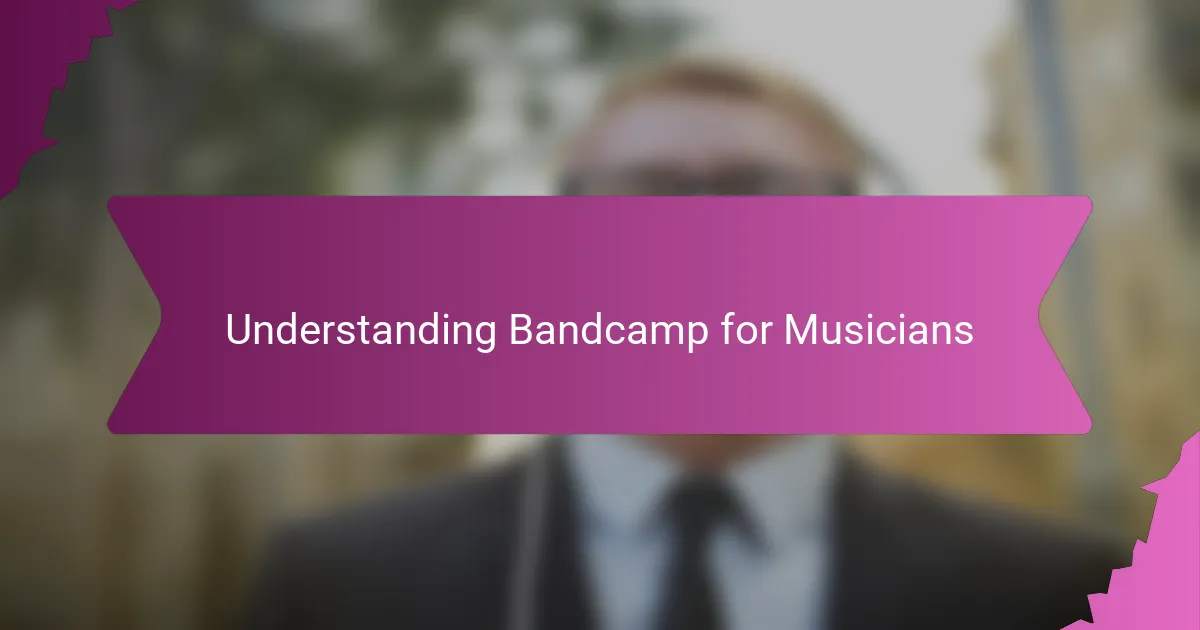
Understanding Bandcamp for Musicians
Bandcamp stands out to me because it feels like a genuine community hub rather than just another streaming platform. Its artist-friendly approach, where musicians set their own prices and get a fair share of the revenue, really resonated with me early on. Have you ever wondered how much control you actually have over your art in the digital age? With Bandcamp, that control becomes more tangible.
From my experience, Bandcamp isn’t just about selling music; it’s about building relationships. The tools they provide—like direct messaging fans and offering exclusive content—make engaging with listeners feel personal and rewarding. It’s as if the platform encourages a two-way conversation rather than a one-way broadcast.
I also noticed how Bandcamp’s layout and design prioritize clarity and simplicity, which makes navigating through artists’ catalogs enjoyable. This ease-of-use helps both the musician and the fan feel connected without the noise of distracting ads. Don’t you think music deserves a space that respects its value this much?
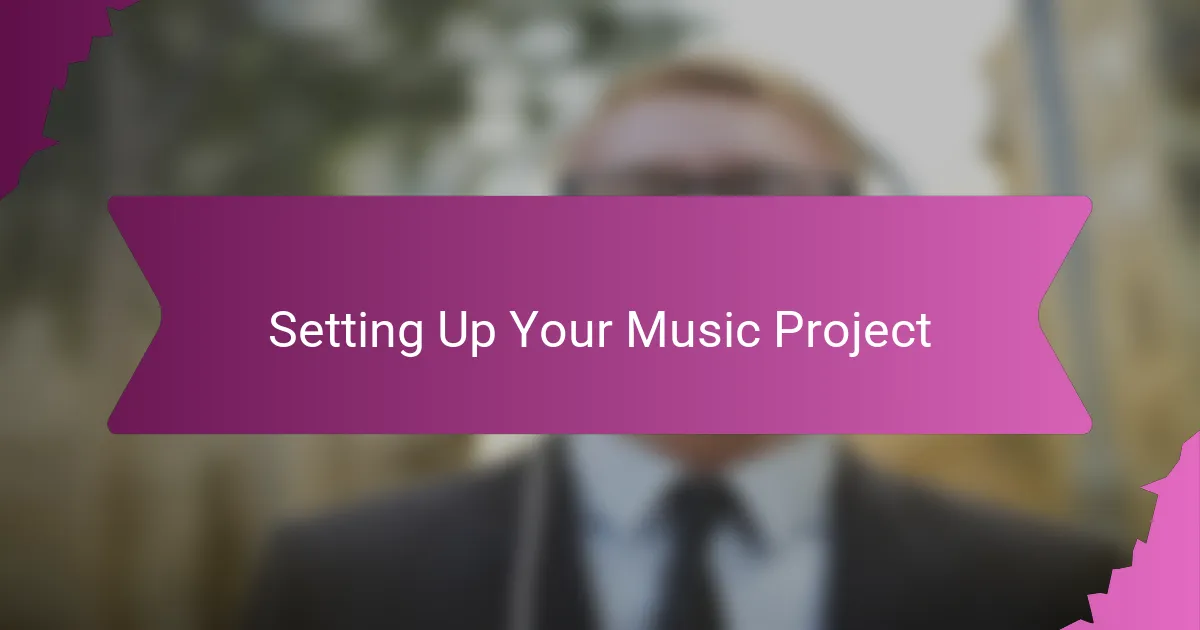
Setting Up Your Music Project
Setting up your music project on Bandcamp was a moment I approached with both excitement and a bit of nervousness. I realized early on that having a clear identity—what I wanted to say musically and visually—was crucial. Do you remember that feeling when your first track is ready to meet the world? That’s exactly the energy I channeled into crafting my project’s name, bio, and artwork.
One thing I found invaluable was taking the time to organize my release thoughtfully. Instead of rushing to upload everything at once, I planned out singles, EPs, and full albums with accompanying stories or insights. This way, each drop felt meaningful, and I could share my journey bit by bit. It transformed the project from just a collection of songs into a narrative that fans could follow and connect with.
I also made sure to link all the important details—social media, credits, even merchandise options—right from the start. This setup gave me peace of mind knowing everything was accessible to listeners and that my project had a professional, polished presence. Have you ever experienced how small details like these can build trust and draw people closer to your music? For me, these thoughtful touches made all the difference.
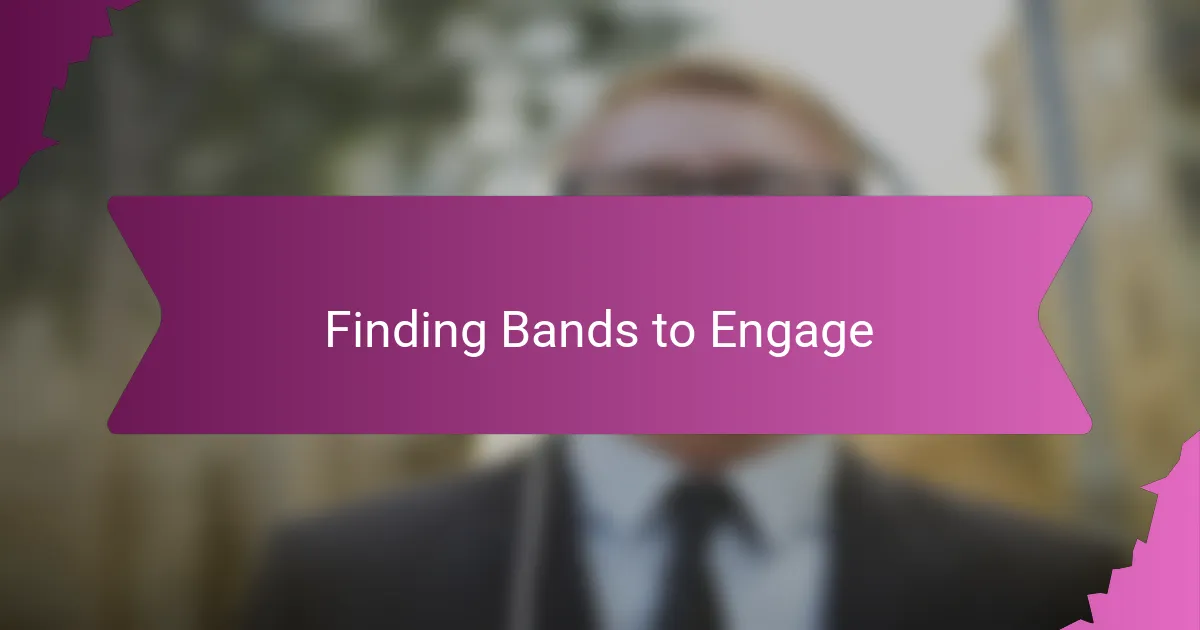
Finding Bands to Engage
Finding the right bands to engage with on Bandcamp often starts with curiosity. I usually dive into genres that resonate with me, but I also allow myself to wander into unfamiliar territories. Have you ever stumbled upon a band you never expected to love because you took a chance exploring? That’s when good discoveries happen.
What really helps me connect is looking beyond just the tracks. I spend time reading bios, checking out their stories, and sometimes even the notes behind each release. It’s like getting a backstage pass to their creative world, which makes reaching out feel more genuine. Don’t you think it’s easier to start a conversation when you know what matters most to them?
Sometimes, I use Bandcamp’s features like fan collections or curated lists to spot bands that might align with my project’s vibe. It’s a bit like gathering breadcrumbs that lead to new collaborations or friendships. Have you tried this approach? From my experience, it turns engagement into an exciting treasure hunt rather than a task.
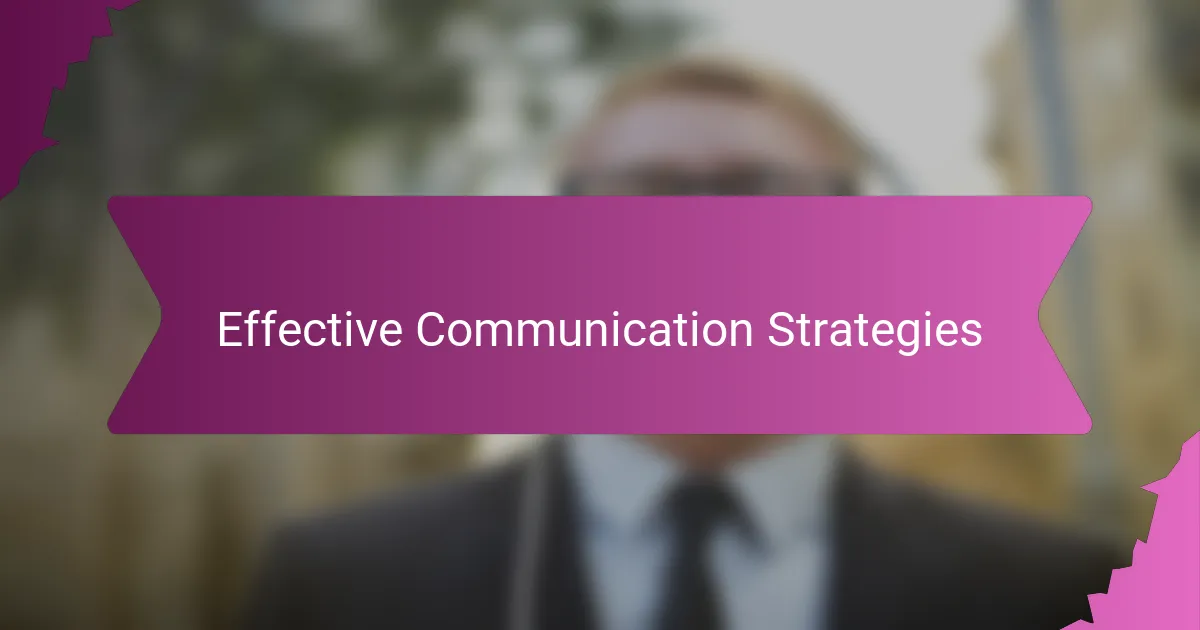
Effective Communication Strategies
When I reach out to bands on Bandcamp, clarity is key. I make sure my messages are concise but warm—no lengthy essays, just genuine appreciation and a clear reason for connecting. Have you noticed how a simple, respectful approach often opens doors more effectively than a generic cold pitch?
Timing also matters a lot. I try to engage right after a new release or when the band shares exciting news. It feels natural to join the conversation then, and I’ve found artists appreciate the timely support. Don’t you think reaching out when enthusiasm is fresh makes interactions more meaningful?
Another strategy I’ve adopted is asking open-ended questions about their creative process or inspirations. It shows I’m truly interested, not just promoting myself. This approach has sparked some of the most authentic and rewarding exchanges I’ve had on the platform. Have you ever experienced how genuine curiosity can transform a simple message into a memorable connection?
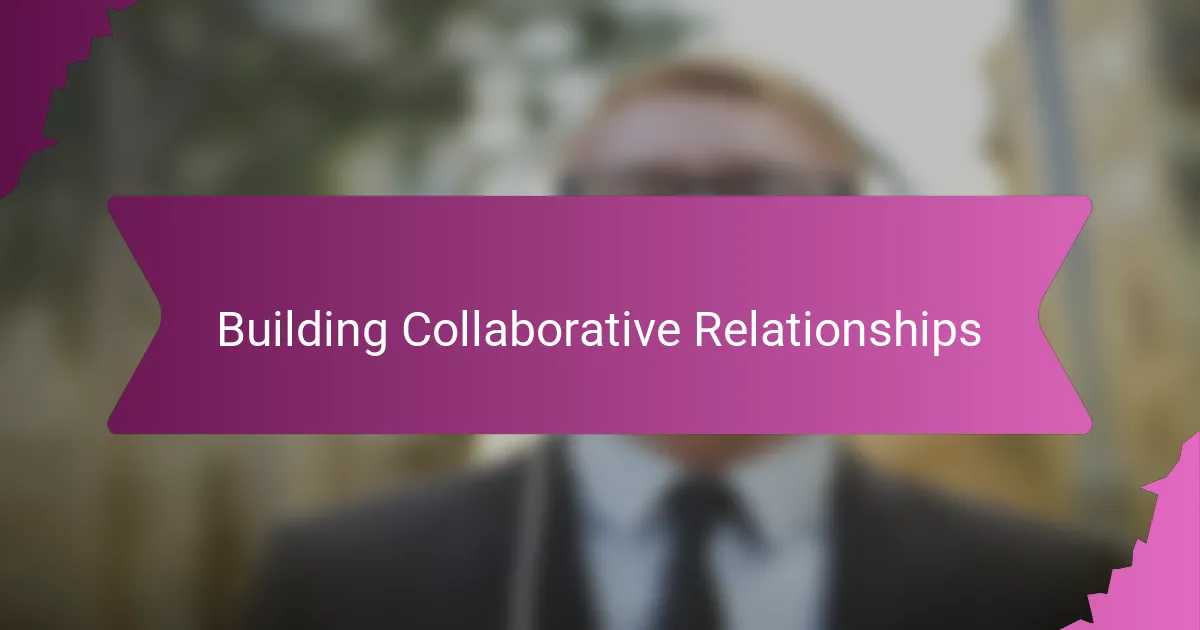
Building Collaborative Relationships
Building collaborative relationships on Bandcamp, for me, goes beyond just exchanging messages—it’s about nurturing mutual respect and shared passion. I remember a time when a casual compliment on a band’s recent release turned into weeks of back-and-forth ideas, eventually leading to a joint project. Have you noticed how genuine enthusiasm can spark connections that feel surprisingly organic?
I’ve also found that showing consistent support makes a difference. Commenting on new tracks, sharing their work with my network, or even purchasing merch signals that the collaboration is valued. Isn’t it amazing how small gestures like these reinforce trust and open doors to creative partnerships?
Sometimes, collaboration starts with simple questions—like asking about their favorite recording techniques or upcoming goals. These conversations often reveal common ground or inspire fresh ideas. Don’t you think that when we listen actively and share openly, the creative possibilities multiply naturally?
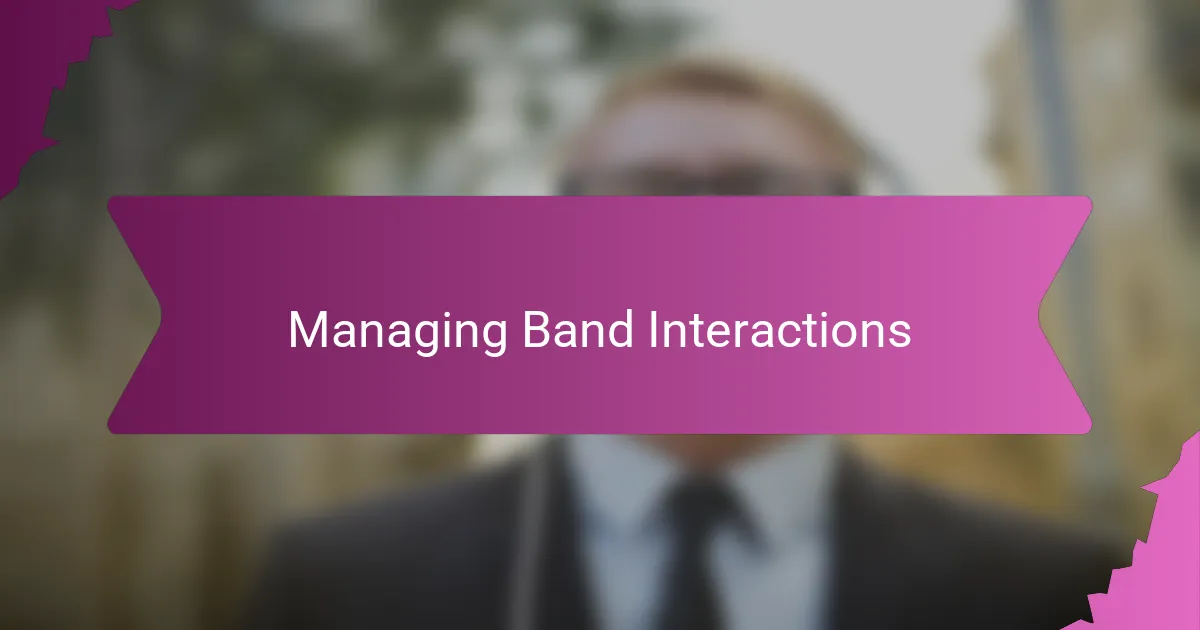
Managing Band Interactions
Managing band interactions on Bandcamp is something I approach with a mindset of respect and attentiveness. I’ve learned that responding promptly to messages, even simple thank-yous, builds a foundation of trust. Have you ever felt overlooked when a message goes unanswered? That’s precisely why I make it a point to acknowledge every interaction, no matter how small.
I also find that keeping track of ongoing conversations can get tricky, especially when engaging with multiple bands. Using notes or reminders helps me remember details like upcoming releases or personal projects to follow up on. This little effort shows bands that I’m genuinely invested, and it often leads to deeper connections.
What’s been most rewarding for me is balancing professionalism with warmth. I aim to be approachable yet sincere, which often turns a standard message exchange into an ongoing creative dialogue. Have you noticed how a friendly tone invites openness and makes collaborations feel more natural?
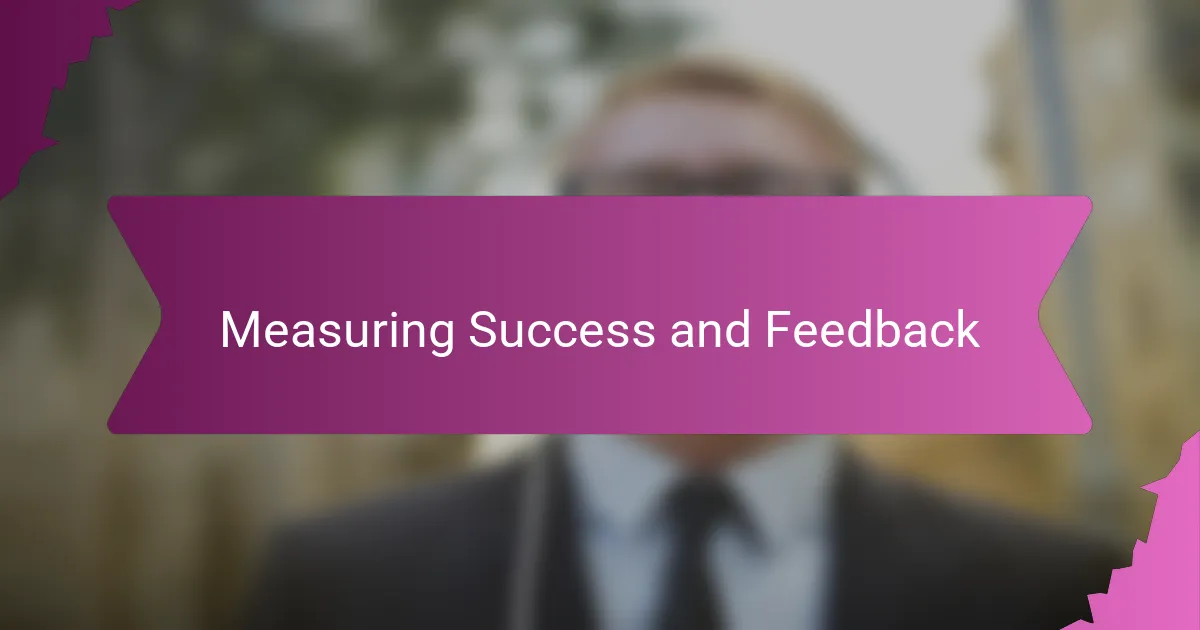
Measuring Success and Feedback
When it comes to measuring success on Bandcamp, I don’t just look at sales numbers or streaming stats. For me, the real indicators are the kinds of conversations that crop up in messages and comments. Have you ever noticed how a thoughtful fan note or a band’s sincere thank-you can feel way more rewarding than just a high play count? That’s when I know my engagement is hitting the right chords.
Feedback can sometimes be tricky to quantify, but I find that paying attention to the tone and depth of responses tells me a lot. When bands share stories about how our interaction sparked new ideas or helped them feel seen, it reassures me that what I’m doing matters beyond metrics. Isn’t it fascinating how qualitative feedback often paints a richer picture than numbers alone?
To keep myself grounded, I track certain benchmarks like the number of ongoing conversations or collaborations stemming from Bandcamp contacts. But honestly, what feels most successful is when relationships evolve naturally, not forced by goals. Have you ever experienced that moment when a new connection just clicks, and you realize you’ve created something genuinely meaningful together? That’s the kind of success I chase.